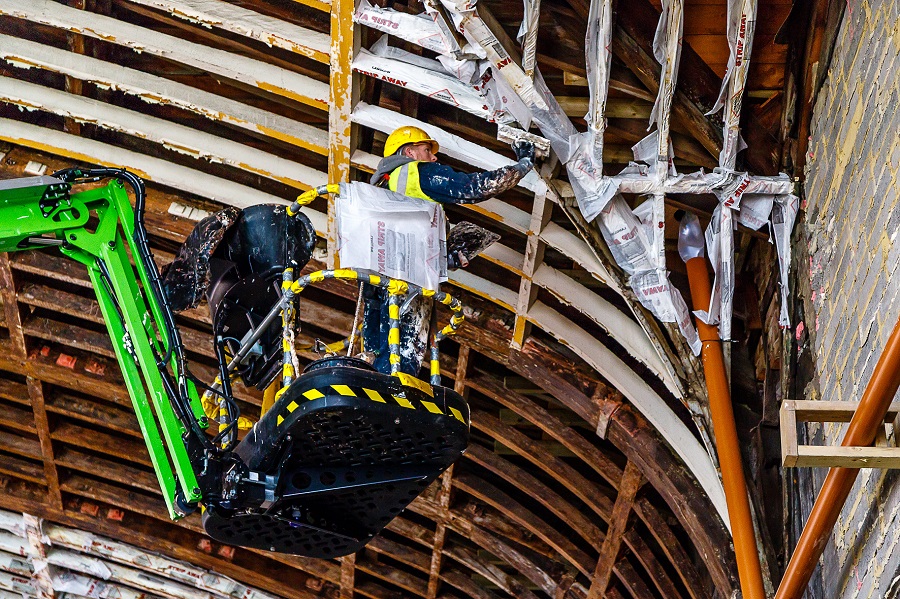
Work on the restoration and redevelopment of the Corn Exchange and Studio Theatre is set to restart next month with the appointment of Westridge Construction Ltd as the preferred interim contractor.
The contractor was identified following a procurement process after the previous company, R Durtnell & Sons, almost collapsed in July 2019.
R Durtnell, the UK’s oldest building firm, has since been given more time to repay its debts by creditors including Brighton and Hove City Council, which it owes almost £800,000.
Further to pre-contract discussions, Westridge will begin essential weatherproofing and drainage work to protect and conserve the historic Grade I and Grade II listed buildings, a former riding house and supper room built by the Prince Regent in the early 19th century.
Westridge is a privately-owned contractor with offices based in Kent, Sussex and Surrey, operating throughout the south east and employing over 190 staff and site technicians.
They’ve recently completed a number of projects in the city including the refurbishment of Hove Town Hall’s, Hannington Lane in Brighton city centre, and a number of new council housing developments in the city including Kite Place in Whitehawk.
Andrew Comben, Chief Executive, Brighton Dome and Brighton Festival said: “We are grateful to Brighton & Hove City Council for their commitment and swift action on procuring an interim contractor. Westridge have an impressive track record of working on heritage building projects such as Ditchling Museum and Battle Abbey.
“We are delighted they are a local company and together with project architects Feilden Clegg Bradley Studios, we look forward to collaborating with their team on progressing the project.”
Martin Buckthorpe, Managing Director, Westridge Construction commented: “It is a pleasure to have been chosen as the preferred contractor to continue work on this prestigious building, reinforcing our positive ongoing relationship with Brighton & Hove City Council.
“Brighton Dome Corn Exchange and Studio Theatre project retains Westridge’s presence in the city centre, following the successful completion of the Hannington Lane development earlier this year. Brighton’s historic landmarks play a key role in the local community and we are honoured to be playing our part in their on-going restoration.”
Councillors agreed to procure and appoint a new main contractor for the project at the Policy and Resources Committee earlier this month.
Councillor Alan Robins, lead member for culture, added: “This is such a unique and important project for the city’s heritage and we are pleased that the committee supported our plan to move forward. It’s an exciting time for the Royal Pavilion Estate and the refurbishment will protect and unite its buildings for future generations to explore and enjoy.”
The major refurbishment of the Corn Exchange and Studio Theatre is the first phase of a wider project to reaffirm Brighton’s Royal Pavilion Estate as a key cultural destination by equipping it for a sustainable future.
The longer-term vision aims to reunite the historic Estate to create a centre for heritage, culture and the performing arts which reflects the unique spirit of Brighton. It’s anticipated that the revitalised Royal Pavilion Estate will support 1,241 full-time equivalent jobs and have an economic impact of £68 million.
The redevelopment will improve venue access for visitors, staff and performers, including new accessible toilets, hearing assistance systems and a public lift providing wheelchair access to all levels of the buildings. A new creative space will be available for community groups and emerging artists to use for workshops, meetings and rehearsals.
£19.13 million of the total project costs has been raised from grant funding from the National Lottery Heritage Fund, Arts Council England, Coast to Capital Local Growth Fund, private trusts, individual donations and contributions from Brighton Dome and Brighton Festival’s own resources.
The Build Brighton Dome community appeal has raised over £130,000 from public donations with match funding of every £1 by The Roddick Foundation.









is it true the council is to blame for durtnell going bust?